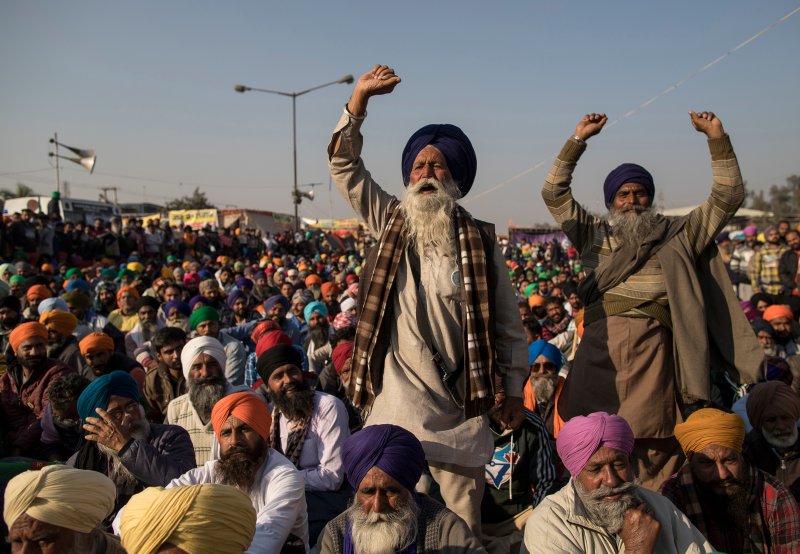HOME | ABOUT US | Speaker | Americans Together | Videos | www.CenterforPluralism.com | Please note that the blog posts include my own articles plus selected articles critical to India's cohesive functioning. My articles are exclusively published at www.TheGhouseDiary.com You can send an email to: MikeGhouseforIndia@gmail.com
Wednesday, February 17, 2021
The Farmers' Protests Are a Turning Point for India's Democracy
Courtesy of Time
Singh is a scholar and historian of South Asia. He is an Equality Fellow for the Open Society Foundations, a Council on Foreign Relations term member, and a Truman National Security Project fellow.
Over the past few years, however, the rise of right-wing authoritarianism has brought India’s democratic standing into question. India has plummeted in democracy metrics across the board, including the Press Freedom Index, where it now ranks 142 of 180 countries, four spots behind South Sudan and three behind Myanmar. The Human Freedom Index ranks India at 111 of 162 countries, just four ahead of Russia. This past September human rights group Amnesty International ceased operations in India following sustained assaults from the Indian government.
The full force and authoritarian tactics of the Indian government have been showcased as they respond to the largest protest in their history. Since September, tens of thousands of Indian have gathered in New Delhi to protest three new agricultural laws that aim to deregulate India’s agricultural industry and open it up to free-market forces. While the need for reforms is urgent, farmers are concerned that the new legislation privileges corporations and harms the everyday farmer. Finally, on Feb. 2, after months of protests, the world’s eyes started to focus on the Indian government’s undemocratic measures, including press censorship, journalist detention, internet shutdowns, and violent crackdowns against the non-violent protestors.
Hindu nationalists have used the occasion to call for genocidal violence against protestors. Twitter removed a tweet from Indian actress Kangana Ranaut that advocated ethnic cleansing of the protestors. Twitter also suspended 500 accounts that called for a repeat of the 1984 pogroms, a dark moment in India’s history.
These calls refer to a period of Indian history reminiscent of what’s happening today. In the 1970s and 1980s, Punjabi Sikhs led similar agitations that called for better government support of agriculture. Their sustained protests along with a self-determination movement drew the ire of the Indian government, which painted the efforts as anti-national. Following a disinformation campaign, the government launched a series of attacks that resulted in mass atrocities and egregious human rights abuses: the military assault on Darbar Sahib (Golden Temple) of Amritsar in June of 1984, the state-sponsored pogroms in November of 1984 following the assassination of Prime Minister Indira Gandhi by two of her Sikh bodyguards, and, in the decade that followed, a campaign of extra-judicial killings that resulted in tens of thousands of civilian deaths. The government of India has never acknowledged or apologized for this spree of violence, and it remains a visceral memory for many Indians, especially Punjabi Sikhs today.
The India Today Group/Getty Images
Those who have been paying attention to Indian politics in recent decades will not be surprised at all. The Prime Minister of India—Mr. Narendra Modi—is also the figurehead of right-wing Hindu nationalism. Notoriously, in 2002, Mr. Modi presided over the anti-Muslim pogroms in Gujarat as the state’s Chief Minister. For his role in the genocidal violence foreign nations banned “The Butcher of Gujarat” from entering their countries, including the United States and the United Kingdom. The U.S. ban was in effect for over a decade and only rescinded when it was painfully clear that Modi would be India’s next prime minister.
Since becoming India’s Prime Minister in 2014, Modi’s government has faced a barrage of criticism from human rights groups, foreign nations, Indian civil society, and opposition political parties for its treatment of minority communities. Most recently, India revoked Kashmir’s constitutional autonomy in 2019—a takeover of disputed territory in contravention to United Nations’ agreement—and oversaw extreme human rights abuses in Muslim-majority areas of Kashmir, including illegal detention, abuse, and torture. Add to these internet shutdowns, limitations on freedom of speech and movement, as well as access to information, education, and healthcare.
Subscribe to:
Post Comments (Atom)


No comments:
Post a Comment